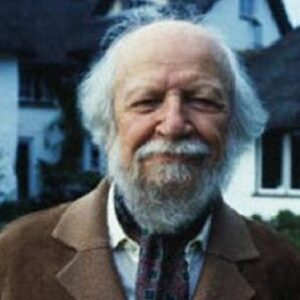In addition to poetry, he wrote novels and plays. A scientist by training, he studied natural science at Oxford for two years before switching to philosophy and literature. His first collection of poems was published before graduation but received little critical acclaim. After graduation, he taught English at a school but left to serve in the Royal Navy during WWII. After 5 years in the army, he returned to teaching and had his first work ‘Lord of the Flies’ published after 21 initial rejections from publishers. After this, he authored several novels, but ‘Lord of the Flies’ was his most popular. His writings largely portrayed his experiences with the army, conflict, human nature, and survival. He was knighted by Queen Elizabeth II.
Early Childhood of William Golding
William Golding was born in 1911 in Newquay, Cornwall, England, to Alec and Mildred Golding. He grew up in Wiltshire with his brother. His father worked at Marlborough Grammar.
His mother was a suffragette activist. Golding was bullied and alienated at his father’s school, according to his only biography published by John Carey.
He studied natural science for two years at Brasenose College, Oxford, but developed an interest in literature and had himself switched to English literature and philosophy.
A Career of William Golding
Poems was published by Macmillan & Co, London in 1934, about the time Golding was about to graduate from Oxford. Adam Bittleston, an Oxford acquaintance, helped him make it happen.
In 1935, he began teaching English and philosophy at Bishop’s Wordsworth’s School in Salisbury, after working in a settlement home and in theatre groups.
Golding left teaching in 1940 to serve in the Royal Navy during WWII. He spent the following 5 years serving his country and traveling by sea. He returned to teaching after the war.
After at least 21 rejections from publishing houses across England, Golding ultimately got his first novel published in 1954 by Faber & Faber, London. The book was about human nature’s harshness.
The novel was based on his experiences working with the army throughout the conflict. The plot follows a group of adolescent guys stranded alone on an island who turn against each other to survive.
In 1955, he wrote ‘The Inheritors’. This was one of Golding’s most famous novels. It was predicated on human violence and deception.
Like ‘Lord of the Flies,’ Golding’s 1956 novel ‘Pincher Martin’ was inspired by his experiences in the army, battle, survival, and violence. The novel’s protagonist is revealed to be battling to survive.
In 1959, he published ‘Free Fall’, an outgrowth of his previous work ‘Pincher Martin’. The novel’s main character is an artist who struggles with the clash of rationality and faith.
In 1964, Golding released ‘The Spire,’ a novel about faith. The tale centers on the dean of a cathedral’s eccentric idea of putting an enormous spire on top of the church.
‘The Pyramid’ came out in 1967. It is a novel about music and English society told from the perspective of a fictional community called Stilbourne. The Scorpion God: Three Short Novels was his second book.
‘Darkness Visible’ came out in 1979. In this story, Golding explores the interdependence of good and evil. Then followed ‘The Paper Men,’ which he dubbed his worst literary achievement.
‘The Sea Trilogy’ was released 1980-1989. ‘Rites of Passage’, ‘Close Quarters’, and ‘Fire Down Below’ depict the emotional and moral evolution of a young traveler.
Lord of the Flies was adapted into a film in 1990. It was the sequel to Peter Brook’s 1960s film adaption. Like the novel, the movies were a hit.
An Egyptian Journal, The Brass Butterfly, The Pyramid, To the Ends of the Earth, A Moving Target, etc.
Honors & Awards
In the 1980s, Golding received a Nobel Prize for his famous and highly renowned work ‘Lord of the Flies’, some two decades after the novel was first published. The queen knighted him.
Personal Legacy of William Golding
Golding married analytic chemist Ann Brookfield in 1939 and they had two children, Judith and David. He died beside her at their home in Cornwall.
Golding died of heart failure in 1993 at Tullimaar House, Perranarworthal. He is buried in South Wiltshire. David and Judith Tullimaar presently live in Tullimaar House.
Estimated Net Worth
William is one of the wealthiest and most popular Novelist. William Golding net worth is estimated at $1.5 Million by Wikipedia, Forbes, and Business Insider.
Trivia
The Double Tongue was published after Golding’s death.
Seahorse, Circle Under the Sea, and Short Measure are among his unpublished pieces.
Golding was a reclusive man who avoided media interviews and never had a biography written about him.
John Carey wrote his only biography, ‘William Golding: The Man Who Wrote Lord of the Flies’, after his death.


